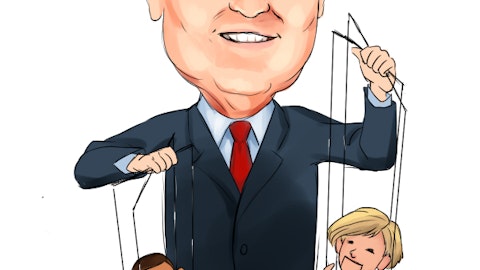
But this time might be different. Shares of RadioShack Corporation (NYSE:RSH) have lost more than 85% of their value since the beginning of 2010. The company reported a worse than expected loss back in July, and ratings agency Standard & Poor’s warned that the company could default on its debt within a year.
RadioShack Corporation (NYSE:RSH) knows that it needs to change — the company is planning to renovate its stores with new displays in the hopes of bringing back consumers. But would-be shareholders should be aware of the challenges facing the company.
Is RadioShack still relevant?
RadioShack Corporation (NYSE:RSH) is really facing a fundamental problem: is there still a reason for it to exist?
Increasingly, the answer appears to be “no.” That 85% share decline has been accompanied by a steady drop in same-store sales and a dwindling cash balance. Last quarter, same-store sales actually increased by 1.3%, a surprising uptick. But that was accompanied by an operating loss of $41 million — about a 300% increase from the previous year.
In the two quarters before that, same-store sales dropped (5.7% in the first quarter, and 7% in the fourth quarter of last year).
RadioShack Corporation (NYSE:RSH)’s answer is to remodel. In the last few months, the company has rolled out a handful of “concept” stores featuring unique displays (Twice has a photo walk-through of the remodeled Manhattan location.). Better looking stores should help, in theory, but it’s far from a guarantee. RadioShack still sells mostly commodity products that are available in numerous other stores and online.
Consider J.C. Penney Company, Inc. (NYSE:JCP): former CEO Ron Johnson spent hundreds of millions of dollars remodeling the retailer to no avail. Same-store sales dropped dramatically during his tenure.
On the flipside, stores like Wal-Mart Stores, Inc. (NYSE:WMT) and Costco Wholesale Corporation (NASDAQ:COST) wouldn’t win any visual awards, yet their businesses continue to dominate their respective retail sectors.
Competition in the space is intense
Moreover, RadioShack Corporation (NYSE:RSH) isn’t the only company remodeling. Its big box competitor Best Buy Co., Inc. (NYSE:BBY) is in the midst of its own turnaround, while wireless carrier AT&T Inc. (NYSE:T) is also focusing on its retail arm.
Best Buy’s new CEO, Hubert Joly, has executed a turnaround plan focused on cost-cutting, bolstering the store’s online operation, and partnering with major electronic firms for mini “store-in-store” concepts. Apple Inc. (NASDAQ:AAPL)’s success over the last few years has been bolstered by its retail arm. Apple’s stores give customers a place to demo and learn about its new products, as well as receive tech support from knowledgeable employees.
Samsung and Microsoft, observing Apple’s success, have shown interest in replicating the strategy. Both companies have signed agreements with Best Buy to set up shop within larger Best Buy stores.
Analysts have praised Best Buy’s moves, including those at Jefferies, who raised their price target to $35 last month (shares are currently trading near $30).
Meanwhile, AT&T has also unveiled plans for a stronger retail operation. Although most would not view the wireless carrier as a direct competitor, RadioShack’s focus on mobile phones (the company said wireless accessories were a key driver of growth last quarter) could be hampered by AT&T’s new strategy.
AT&T has built its first concept store in Chicago, and plans to roll out the design to 2,300 stores by 2014. Bloomberg calls AT&T’s new design a “blatant knock-off” of Apple’s stores — but that could be a good thing for AT&T.
With AT&T focusing on its retail operation, it may mean that more subscribers are going to the AT&T store to buy their phones and accessories — not RadioShack Corporation (NYSE:RSH). AT&T is far from the only carrier, but it does have nearly a third of the market. Moreover, if its strategy is successful, it would not be unreasonable to assume competitors like Verizon Communications Inc. (NYSE:VZ) and Sprint Nextel Corporation (NYSE:S) would follow suit.





